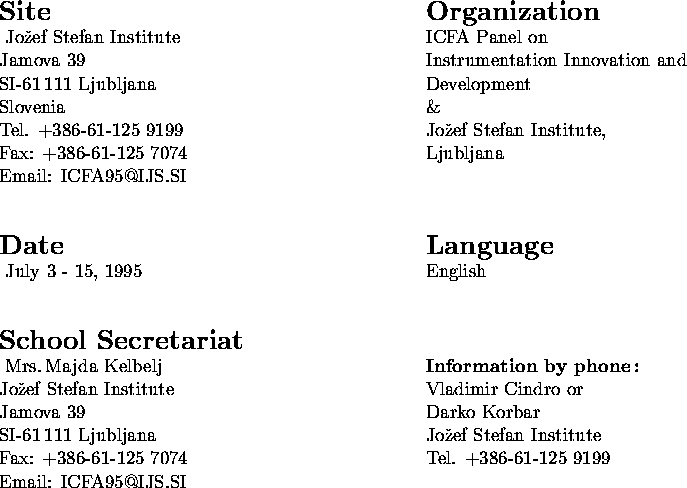




Topics to be covered are: physics of particle detection, gaseous detectors, particle identification, calorimetry, silicon detectors, signal processing and data acquisition. In addition, several review talks are devoted to new techniques, as well as to applications in medical physics, astrophysics and particle physics.
In laboratory courses students work in small groups to exercise selected experimental techniques: multiwire proportional chambers, silicon detectors, microstrip gas chambers, scintillating fibres, analog and digital circuits and data acquisition.
The School is aimed at improving the level of knowledge on instrumentation with special emphasis on applications in particle physics, medicine and industry. Participants are advanced graduate students or young researchers, while the instructors are acknowledged experts in their field. The selection of lectures and practical experimentation has proved extremely popular among students in previous Schools.
The School in Ljubljana will be the sixth in a highly successful series of which three schools were held at ICTP in Trieste, Italy (in 1987, 1989 and 1991), one in Rio de Janeiro, Brazil (1990), and one in Bombay, India (1993). The 1995 ICFA School on Instrumentation in Particle Physics will take place at the Jozef Stefan Institute and the University of Ljubljana, Slovenia, from July 3 to July 15, 1995.
The participation in the School is by invitation only. Participants who wish to receive an invitation, should send an application in the prescribed format and other necessary documents before March 10, 1995. The selection of participants from the applicants will be made by the International Organizing Committee.
The application form and other forms required for admission to the School are enclosed with this bulletin. Additional copies and related information may be obtained from the ICFA'95 School Secretariat. Those wishing to apply through email should request the email version of the application form from the email address given above.
 40 USD per day) of the participants
will be borne by their home institutions. In order to cover the organizational
expenses for the School, the ICFA Panel and the Local Organizing Committee
are soliciting funds from various
national and international agencies like CERN and World Lab (Switzerland),
DESY (Germany), INFN and ICTP (Italy), IN2P3 (France), RAL (UK),
TRIUMF (Canada), DOE, FERMILAB, NSF, BNL, SLAC and Open Society (USA),
KEK (Japan), the Jozef Stefan Institute and the
Ministry of Science and Technology of Slovenia. Part of these funds will
be used to provide partial support for travel expenses (APEX fares)
for some of the participants primarily from
developing countries. Partial support for
subsistence expenses may also be available for some of the needy
participants. Such financial support will be available only to those
who attend the entire activity and who are actively pursuing research
in related fields. As the scarcity of funds allows apex fares to be
granted only to a limited number of participants, every
effort should be made by the
applicants to secure financial support from funding
agencies within their home country.
40 USD per day) of the participants
will be borne by their home institutions. In order to cover the organizational
expenses for the School, the ICFA Panel and the Local Organizing Committee
are soliciting funds from various
national and international agencies like CERN and World Lab (Switzerland),
DESY (Germany), INFN and ICTP (Italy), IN2P3 (France), RAL (UK),
TRIUMF (Canada), DOE, FERMILAB, NSF, BNL, SLAC and Open Society (USA),
KEK (Japan), the Jozef Stefan Institute and the
Ministry of Science and Technology of Slovenia. Part of these funds will
be used to provide partial support for travel expenses (APEX fares)
for some of the participants primarily from
developing countries. Partial support for
subsistence expenses may also be available for some of the needy
participants. Such financial support will be available only to those
who attend the entire activity and who are actively pursuing research
in related fields. As the scarcity of funds allows apex fares to be
granted only to a limited number of participants, every
effort should be made by the
applicants to secure financial support from funding
agencies within their home country.

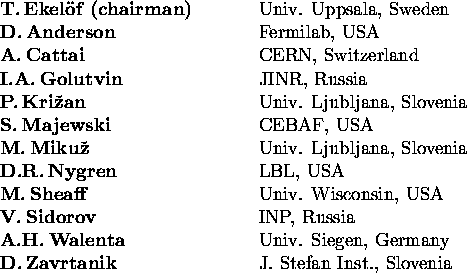

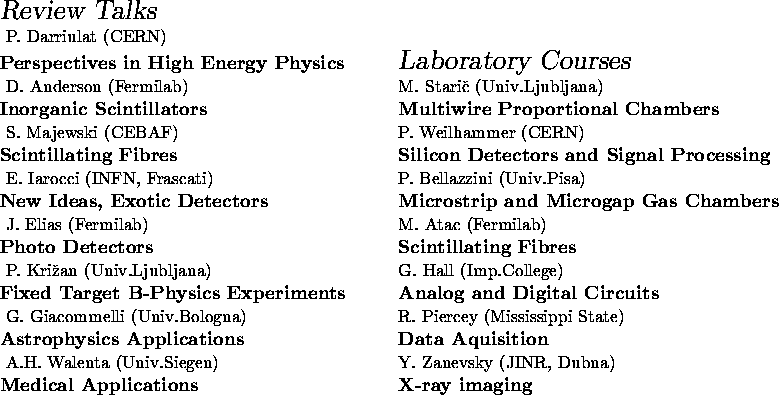
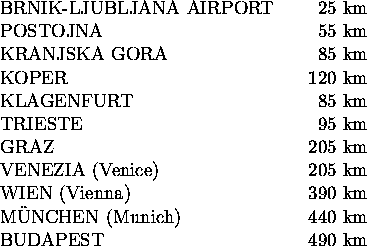
ARRIVING TO LJUBLJANA:
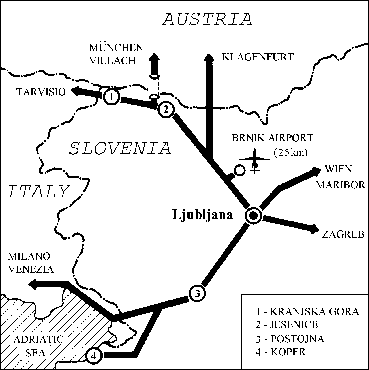
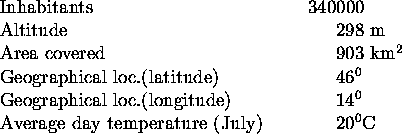
At the time of Roman rule, from the 1st to 6th centuries AD, the capital of contemporary Slovenia was called Emona.
Ljubljana is first mentioned in written sources from 1144, its historical rise beginning in the 13th century when it became the Capital of the Province of Carniola. In 1335 it came under Hapsburg rule.
From the end of the Middle Ages onwards, the town gradually assumed the role of the Slovenian cultural capital. Slovenian Protestantism, as the most powerful social movement of the 16th century, was a major influence in this. Ljubljana was then the meeting-place of the nationally conscious. Primoz Trubar, who gave the Slovenes their first book in 1550, worked here and many years later, France Preseren and Ivan Cankar, two important figures in the struggle for the cultural and political freedom of the Slovenian nation, produced their works here.
Ljubljana had an important role in Napoleonic times, even being the capital of the entire Illyrian province between 1809 and 1813.
The building of the Vienna-Trieste railway in the mid 19 century linked Ljubljana with the world, and
was decisive in the further development and organization of the town.
century linked Ljubljana with the world, and
was decisive in the further development and organization of the town.
World War I brought the break with the Hapsburg dynasty. Austro-Hungary disintegrated and Slovenia joined the new state, the Kingdom of the Serbs, Croats and Slovenes.
After World War II, Ljubljana became the capital of Slovenia, one of the six republics of Yugoslavia.
Today Ljubljana is the capital city of the independent state of Slovenia, the heart of the political, economic, cultural and scientific life of the Slovenian nation, which its inhabitants and many visitors have described as a "city of human dimensions". Ljubljana with only some 340 000 inhabitants and thus one of the smaller or medium sized European cities, is nevertheless a great city. It has everything of which cities of a million boast, as well as being the national centre, and even more - it contains all that gives a city worldly magnitude. Besides the archaeological remains from the time of Roman Emona, buildings and artifacts with a tinge of Italian and Austrian artistic style and the work of domestic architects, who nevertheless gave the town an original Slovenian image and influenced the contemporary appearance of the town, there are also many things, especially in the lives of the inhabitants, which tell of past and present cultural history. The rich cultural life of Ljubljana undoubtly has its roots in its permanent links with the world, in all that it has accepted from it and given to it in its integration in European and world culture.
At present the Institute, totalling about 800, has a research staff of nearly 550: about 250 of them are post-graduates, temporarily employed while obtaining their degrees, almost 200 have doctorates and 100 have permanent professorship or temporary teaching assignments at the Universities (Ljubljana and Maribor).
In view of its activities and status, the Jozef Stefan Institute plays the role of a kind of national institute, complementing the role of the universities and bridging the gap between science and industry.
The researchers of the Experimental Particle Physics Department at the Institute are members of four high-energy physics collaborations, CPLEAR and DELPHI at CERN, and ARGUS and HERA-B at DESY. In the Detector Development Laboratory, R&D is carried out with the aim to supply hardware to existing and planned experiments, and to apply high-energy physics techniques to other fields, notably medicine and environmental science.


